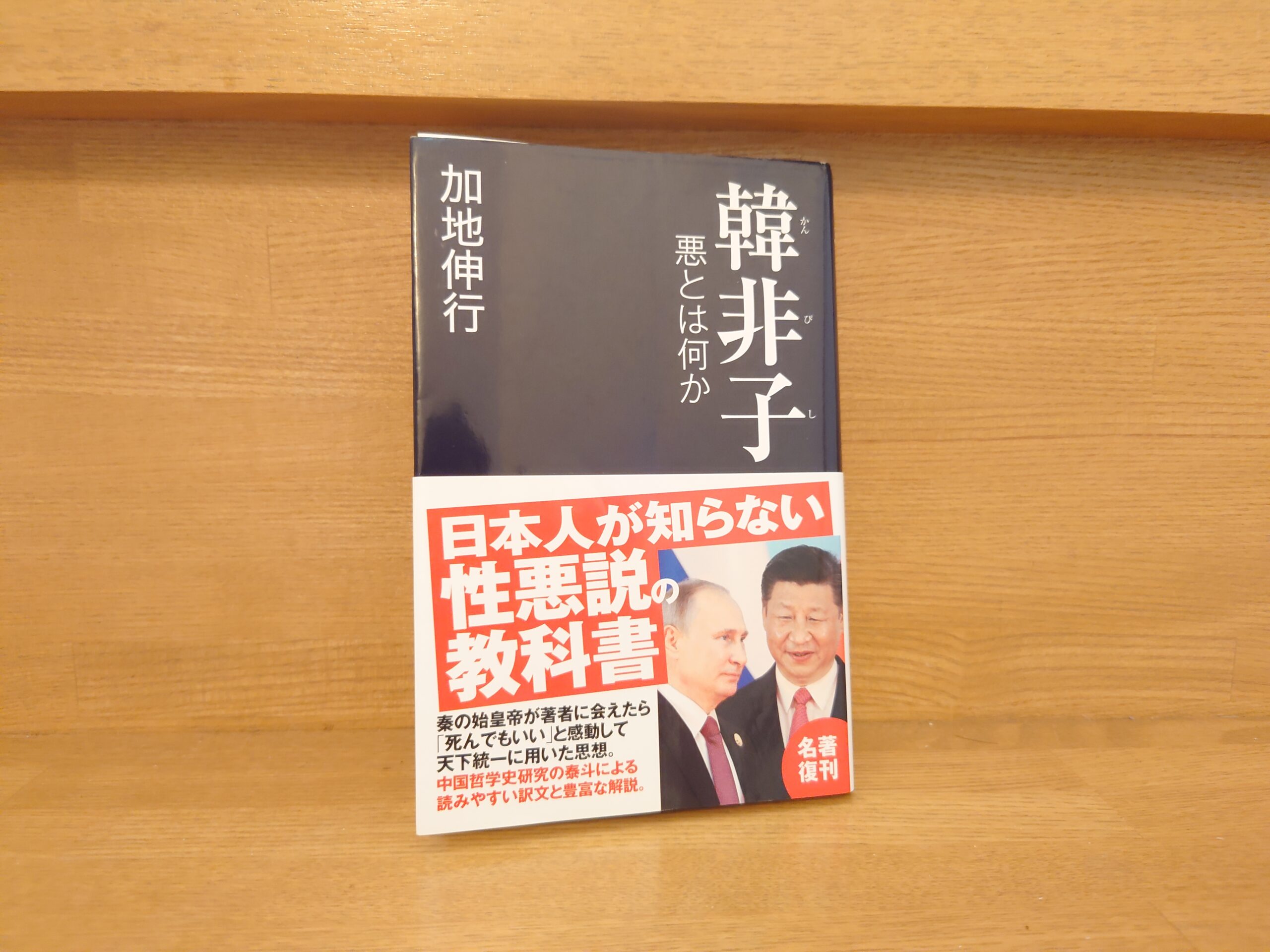Summary and Comments on "Han Feizi: What is Evil?" by Nobuyuki Kaji - A thorough insight into human nature based on the theory of sexual vice! Legalism that strongly influenced Qin Shi Huangdi
I would like to introduce to you the book "Han Hezi: What is Evil?" by Nobuyuki Kaji, published by Sankei Shimbun Publications in 2022.
Let's take a quick look at the book.
Japanese people do not know
AmazonProducts Page.
Textbook of Sexual Evil
Han Feizi, a philosophy used by Qin Shi Huangdi to unify the country after he was moved to "die" if he could meet the author.
A reissue of a classic work with an easy-to-read translation and extensive commentary by a leading scholar of the history of Chinese philosophy.
In Han Feizi, evil is confronted. He acknowledges evil as fact and tries to use the law to overcome it. It is combative. Furthermore, it tells us to be superior to evil, and to play tricks of our own. In other words, "Han Hee-ji" is a book about evil. In other words, "Han Hee-ji" is trying to confront evil with evil. To evil, we must apply the law, or evil (jutsu) - that is to say, the logic of evil.
--Excerpt from "What is 'Han Feizi'?
In this book, you will learn about the ideas of Han Non, a leading Chinese thinker who represents the legal family.
Nobuyuki Kaji has been featured on this blogConfucius."andWhat is Confucianism?"Kaji is the author of "The World's Most Interesting Books" and is well-known for his interesting and easy-to-understand style. His Kaji's style is also brilliant in this work. Let's take a look at some of his commentary on "Han Feizi.
We are ordinary people. We are ordinary people who live in this world with all the effort we can muster.
However, there are times when I look back and ask myself what on earth I am living for. But since both of us have poor brains, it is impossible for us to answer the question correctly.
In such cases, we would be wise to look to the classics for the answer. There is no evil in the classics. They are the property of mankind, having survived and been read by people for a long time. They can give us much more accurate answers than if we go to a living person for advice.
One of the classics is the book Han Feizi.
Of course, there are many classics. Even in China, there is no shortage of classics to choose from, including "The Analects" and "Laozi. Among such classics, "Han Feizi" is uniquely colored. In other words, there is no hesitation in the entire work. Its tone is strong and robust. As you read it, you feel as if you, too, are becoming stronger. There is no sense of weakness.
In the classics of the classics, "The Analects" and "Lao Tzu," there are still some weak, complaining words. However, "Han Feizi" is a book that teaches us to move forward, forward, forward without hesitation, as if the trumpet of a charge is sounding high in the air.
Why is that?
The main reason for this is that "Han Hee-ji" has a systematic attitude of looking at everything dispassionately from a certain conviction, a certain view of humanity, and a certain truth. This conviction, view of mankind, and truth is unwavering throughout the entire book. His unwavering confidence and intensity are overwhelming.
What, then, is "a certain conviction, a certain view of humanity, a certain truth"?
There is only one answer. It is the eternal truth that "man is selfish.
Han Hee Tzu" is a book that continues to teach that human beings are selfish and that they base all their actions on selfishness. This may sound too clear-cut and blunt, but as one would expect from a thinker, the argument does not stop there. He is a thinker, and his argument does not stop there. He protests, "What is ideology? Without such an insight into what human beings are, he is waging a spectacular rebellion, saying that we should not engage in frivolous and empty "textbook" discussions.
Sankei Shimbun Publications, Kaji, Nobuyuki, "Hanpiko: What is Evil?" p. 176-177
How about it? This commentary will make you interested in "Han Feizi".
This book contains "Han Feizi" in an easy-to-read modern language.
Rei is a means of adorning the outside and revealing the inside of one's self.
Sankei Shimbun Publications, Kaji, Nobuyuki, "Hanpiko: What is Evil?" p. 31
What keeps a nation alive is not benevolence or righteousness, which Confucianism values.
Sankei Shimbun Publications, Kaji, Nobuyuki, "Hanpiko: What is Evil," p. 84.
The seed of misfortune that befalls a sovereign is in trusting others. Trust in a man, and you will be subdued by him.
Sankei Shimbun Publications, Kaji, Nobuyuki, "Hanpiko: What is Evil?" p. 101
In the "Han Feizi", Han Feizi also offers sharp criticism of Confucianism, which attempts to rule by benevolence, righteousness, and virtue, as well as the famous "Shu-shu" and "contradiction" theories.
My personal opinion is that I have read it before.The Analects of ConfuciusIt is by far easier to read than the other two. And it is interesting that the content is told with a bit of irony or black humor. I was left with the impression that I felt as if I was reading a short story by Chekhov. Especially the previously introducedThe People in Disguise.This is especially true for the two men. This match is the result of their calm and thorough human insight. It was very interesting.
It was an extremely stimulating and interesting read. It is a book that overturns the image that the classics are rigid and formal. I highly recommend this book.
The above is "Kaji Nobuyuki's Han Feizi: What is Evil?" - A thorough insight into human beings based on the theory of sexual vice! Legalism that strongly influenced even Qin Shi Huangdi".
Click here to read the previous article.
Related Articles





































